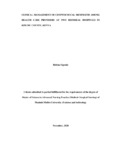Please use this identifier to cite or link to this item:
http://ir-library.mmust.ac.ke:8080/xmlui/handle/123456789/1449Full metadata record
| DC Field | Value | Language |
|---|---|---|
| dc.contributor.author | Ogendo, Robina | - |
| dc.date.accessioned | 2020-12-11T09:59:08Z | - |
| dc.date.available | 2020-12-11T09:59:08Z | - |
| dc.date.issued | 2020-11-12 | - |
| dc.identifier.uri | http://r-library.mmust.ac.ke/123456789/1449 | - |
| dc.description.abstract | Cryptococcal meningitis is one of the most common and lethal opportunistic infections among human immune virus infected clients/patients before initiation ofantiretroviraltherapy. Itis majorly associatedto morbidity and early mortality among human immunodeficiency virusinfected patients in resource limited countries. The main objective of this study wasto investigatethe clinical management of cryptococcal meningitis in adults among health care providers at two referral hospitals in Kisumu County, Kenya.Across-sectionalstudyusing quantitative approachwasused targeting119health care providers.Collectionof data wasthrough pretestedself-administered questionnaires to determineclinical managementstrategiesandexaminefactors influencing clinicalmanagement of cryptococcal meningitis. Apre-testedobservational check list wasused to assesstheadherence to World Health Organizationguidelines in the management of adults with Cryptococcal Meningitisamong health care providers.Data obtained wasanalyzed using thestatistical package for social scienceversion25.Descriptiveanalysis was doneusingfrequencies, percentages and means. Inferential analysis was conductedusingbivariate logistic regressionto determine relationshipsamong the variables, p-values ofat orbelow 0.05 wereconsidered statistically significant. Thestudy established that a satisfactory number of health care providers(55.7% n=65)practicedgood clinical management strategies.61 % (n=37)of the health care workers were adhering to World Health Organizationrecommendedguidelines on management of cryptococcal meningitis.Themajorfactorassociated positively with clinical management of cryptococcal meningitis was the acknowledgement by thehealth care providersthattheworld health organizationguidelines lead to a better patient outcome (97%, n=113)andinadequate supplies and resources to facilitatemanagement(78%, n=90)was themajor factor associated negatively. Respondentswho had experience of five years or less were 80% more likelytopracticegoodclinical management strategies in contrast to those with an experience of six years or more (OR: 1.8; 95%CI: 0.6 –2.2; p=0.008).Nurses were 40% less likely to adhere to the world health organizationrecommended guidelines on management of cryptococcal meningitiscompared to clinical officers (OR: 0.6; 95% CI: 0.4 –0.9; p=0.01).Health care providerswith an experience of five years or less were 40% more likely to agree that the factors were influencing clinical management of cryptococcal meningitisin contrast to those with an experience of six years or more (OR: 0.6; 95%CI: 0.1 –0.74; p=0.04).Inconclusiona fewhealth care providerspracticed good clinical management strategies and adhered to the world health organizationrecommended guidelines but had inadequate supplies and resourcesto facilitatethe clinical managementhencecriticalaspects in the world health organizationrecommended guidelines were notcarried out.Thestudy therefore recommendsthatthe policymakers intheCounty government of Kisumuand the hospital management teams to provide periodic and inductive training opportunities on clinical management of patients with cryptococcal meningitisespecially thosehealth care providerswith years of experience of 5 years and below, scale uptimely supportive supervisionon adherence to WHO gold standard guidelines on management of cryptococcal meningitisand avail adequateresources, facilitiesand supplies in the study area,which will promote effective clinical managementof cryptococcal meningitis. | en_US |
| dc.description.sponsorship | MMUST | en_US |
| dc.language.iso | en | en_US |
| dc.publisher | MMUST | en_US |
| dc.subject | Clinical, Cryptococcal, Meningitis, Health care, Providers, immunodeficiency, Virus, | en_US |
| dc.title | CLINICAL MANAGEMENT OF CRYPTOCOCCAL MENINGITIS AMONG HEALTH CARE PROVIDERSAT TWO REFERRAL HOSPITALS IN KISUMU COUNTY,KENYA | en_US |
| dc.type | Thesis | en_US |
| Appears in Collections: | School of Nursing, Midwifery and Paramedical Sciences | |
Files in This Item:
| File | Description | Size | Format | |
|---|---|---|---|---|
| Robina Ogendo.pdf | 1.82 MB | Adobe PDF |  View/Open |
Items in DSpace are protected by copyright, with all rights reserved, unless otherwise indicated.
